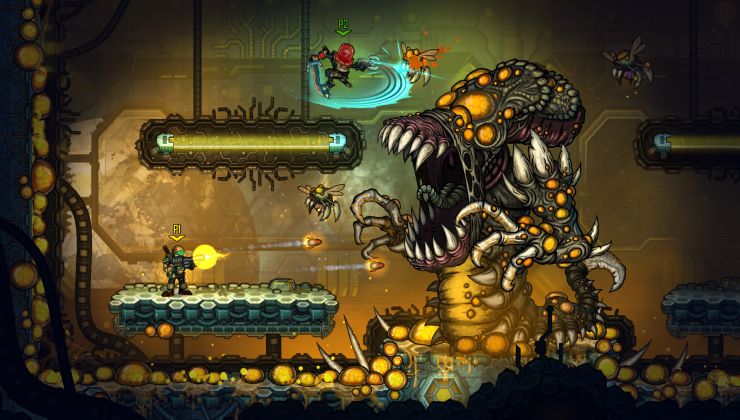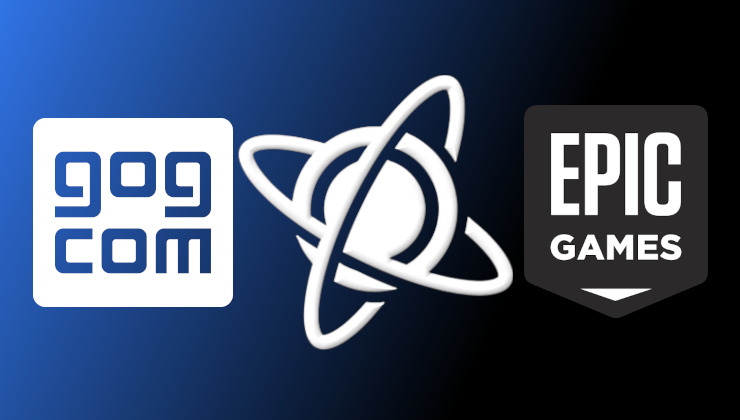The annual game developer survey from GDC is out now for 2022 and it has some interesting insights as usual. That includes thoughts on the upcoming Steam Deck, with it clearly not selling everyone.
Having a little browse through it today and here's a few things to stuck out to me. For starters, of the ~2,700 developers surveyed about 7% said they are currently developing for Linux. Interestingly, 8% said their next project would be developed for Linux. When it comes to what platform developers are most interested in, Linux sat at 7%. As expected all three of those saw "PC" as the top platform, which by that they of course mean specifically Windows.
Stadia, Google's once promising cloud gaming solution doesn't seem to be really getting any love with it seeing 3-5% in those same questions. Streaming just doesn't seem all that popular with developers, with even Xbox Project xCloud (now just called Xbox Cloud Gaming) also seeing pretty low percentage interest from developers.
Browser-based gaming is here to stay though, as according to the survey it seems 9-11% of developers are currently doing it or planning to do it.
What about the Steam Deck though? The question posed was "Do you think Valve Software’s Steam Deck will be a viable game platform in the long term?" and only 36% said yes with 17% saying no and the rest unsure. Some of the developer comments were interesting on the Steam Deck ranging from excitement about "a product gamers have wanted for a long time" to saying they "don’t think it will deliver anything revolutionary that isn’t currently being delivered by the Switch".
The Steam Deck is interesting, as any developer / publisher we've seen actually receive a devkit unit has been practically universally praising the device. Seeing is truly believing then.
How about VR? Well, the majority (40%) are currently developing for Oculus devices. Interest seems reasonable for the Valve Index and HTC Vive, which support Linux, as 20% said they were currently developing for those. The VR market does not sound healthy from the responses though, with an increasing amount of developers who previously worked on VR now not working on any games.
A divisive one is NFTs and the (good) news there is that 70% of developers said they were not interested, with only 21% being "somewhat interested" and 7% being "very interested" and 1% already using them. Some of the responses there made me laugh ranging from it's "the wave of the future" to the blunt "How this hasn’t been identified as a pyramid scheme is beyond me".
I would guess also that a lot of people don't own laptops. It's not hard to see why. They're harder to maintain, upgrade, or replace parts (or at least more expensive).I still don't really get what the audience for the Steam Deck is. I kind of want to buy one, but then I remember I have no use for it. I can play games in bed with my laptop. I have 4 GNU/Linux computers already. If I'm outside, I don't want to play games, otherwise I wouldn't have gone outside.
I guess I don't really understand the portable gaming idea to begin with. I did play Pokemon a lot as a kid, but those days are long gone. I played a lot of mobile games when I was younger, too, but that was mostly the novelty of it rather than them being any good. I don't think that phase lasted very long.
I guess it doesn't help that a lot of the games I play involve using Textractor, copying text to the clipboard, looking it up in a J-J dictionary, and creating an Anki card. Not really the type of gaming suited for a small, portable device without a keyboard.
I just have no idea what to think, because I am clearly not the target audience for this.
Well, there's obviously a target audience for mobile gaming. The target audience for Steam Deck is mainly the intersection of these with the Steam users. They already own (often lots of) games running on Steam Deck, and they can play games bought for mobile on their PC as well.
The appeal of mobile gaming? Well, I'm not into it either, but I can understand that a laptop is too big for bed for many. And back in the days, before Covid, I was using public transports for a 3/4 hour to work and a 3/4 hour back. Time for gaming, maybe?
Half of my computers are old Dell laptops (fantastic to repair while still in warranty). In the past 6 months, the USB hub in one of them appears to have shorted out or something and can only push enough power to storage devices and nothing else, the NIC in another laptop died and I had to buy a USB NIC (which meant several hours trying to get the out-of-tree realtek driver work on a new Arch install, but I learned a few new tricks), and the battery in my other Dell laptop no longer charges (thankfully it has an extra bettery).
Oh yeah, and with the ASUS laptop I bought exactly 2 years ago, the cord for the power brick, as it's called, stopped working and I needed to replace it with one of the cords I kept from somewhere or other. This led me to look up finding a replacement charger for this laptop—not easy, ASUS lists it but doesn't sell it. There's an Ebay listing, and that's about it.
All this to say...yeah, I get the appeal behind a smaller, easier-to-maintain device where the vendor actually sells replacement parts and is happy to let you repair your own device or find a willing third party to. I don't even know what I'm going to do when the power brick for my ASUS laptop dies...go to Ebay, I suppose.
I have half a mind to blame GNU/Linux for breaking all of these laptops (as I only installed it on them in the past year or so), but realistically, they've probably just seeing a lot more use than before.
I had a friend who got into XCloud or something similar while commuting, but me, I just don't really care for playing games in public or out and about; I'd rather read a book, personally.
Now, if only Worm came out in paperback...
Last edited by pleasereadthemanual on 22 Jan 2022 at 1:17 pm UTC
I still don't really get what the audience for the Steam Deck is. I kind of want to buy one, but then I remember I have no use for it. I can play games in bed with my laptop. I have 4 GNU/Linux computers already. If I'm outside, I don't want to play games, otherwise I wouldn't have gone outside.A few years ago I'd probably feel similarly; I already had a buff gaming rig and a body that could handle sitting in front of it all day, why would I need anything else? As I get older the idea of playing less technically demanding games (in my case, a significant fraction of my library) while lounging on the couch or in bed sounds better and better, and I've personally never found laptops comfortable to play on in those scenarios even back when I used to have one. It'll also be nice for my annual multi-week trip to visit family in another state, both as a way to access my library and for general web-browsing. But if you don't feel an inclination for it, that's fine. Life situations are different (and change over time, as I discovered).
I guess I don't really understand the portable gaming idea to begin with. I did play Pokemon a lot as a kid, but those days are long gone. I played a lot of mobile games when I was younger, too, but that was mostly the novelty of it rather than them being any good. I don't think that phase lasted very long.
I guess it doesn't help that a lot of the games I play involve using Textractor, copying text to the clipboard, looking it up in a J-J dictionary, and creating an Anki card. Not really the type of gaming suited for a small, portable device without a keyboard.
I just have no idea what to think, because I am clearly not the target audience for this.
But for indie developers I think it's a different story. Suddenly this console gives their games more appeal, and I think these games give the console more appeal.
When I look at the Steam catalogue and look at games like Tooth and Tail, The Riftbreaker, Blasphemous, Dead Cells, Hollow Knight.. in fact all indie "something-Knight"'s, etc.
I see more appeal for playing them in a handheld console and at the same time, I think the console increases the appeal of these games.
I mean I would play most them in my phone if I could, and if my phone had a gamepad.
When I look at the Steam catalogue and look at games like Tooth and Tail, The Riftbreaker, Blasphemous, Dead Cells, Hollow Knight.. in fact all indie "something-Knight"'s, etc.
I see more appeal for playing them in a handheld console and at the same time, I think the console increases the appeal of these games.
I mean I would play most them in my phone if I could, and if my phone had a gamepad.
That would be Nokia N-Gage. Not very popular product though and was discontinued back in 2006. Symbian did have some games, even commercial ones.
Android phones seem to have gamepad attachments though, which I'm even less familiar with. There's even some indie games without microtransactions available.
I guess Steam Deck can somewhat act as a phone as these days regular phone calls are rare. If Facebook and Twitter work, that's quite lot of things done on a phone covered.
I still don't really get what the audience for the Steam Deck is. I kind of want to buy one, but then I remember I have no use for it. I can play games in bed with my laptop. I have 4 GNU/Linux computers already. If I'm outside, I don't want to play games, otherwise I wouldn't have gone outside.I get this whenever I explain that I have a preference for handhelds. I totally get using a program that hooks text and 1) that not existing on any handheld like a 3DS or Vita, and 2) that being cumbersome on anything without a proper mouse and keyboard. I used to use something like that and I know that it wouldn't work well on a handheld unless you had some system that would let you highlight text and ask for a definition, kind of like an overlay or what some e-readers do. I prefer handhelds because uhhh I don't really know. I like the form factor and for someone with extremely awful vision I can use the decent near-sided vision to my advantage. I use a kobo e-reader for this reason since looking at a monitor for too long can easily cause a migraine and its easier for me to see it if I can move it closer to me.
I guess I don't really understand the portable gaming idea to begin with. I did play Pokemon a lot as a kid, but those days are long gone. I played a lot of mobile games when I was younger, too, but that was mostly the novelty of it rather than them being any good. I don't think that phase lasted very long.
I guess it doesn't help that a lot of the games I play involve using Textractor, copying text to the clipboard, looking it up in a J-J dictionary, and creating an Anki card. Not really the type of gaming suited for a small, portable device without a keyboard.
I just have no idea what to think, because I am clearly not the target audience for this.
I was a launch adopter of both the 3DS and the Vita and of course I pre-ordered a Deck. The switch made me realize that UMPC type things were kind of missing with many of them either under performing and/or being very expensive among other things. With the switch, handheld users got the same games as regular console users which is a huge advantage to me. I got an Nvidia Shield Portable because of the switch and it sort of gets close to what I was thinking of but the idea of running anything on it is what I really wanted. It would be a tablet that runs a full OS but instead of being centered around touch controls or connecting peripherals to fill in the gaps, it would have those controls and "just work".
It is one of those things that I find really difficult to explain why I use something like the Vita still and I struggle to turn on the PS4 even when there is something I am more interested in on the PS4. To be fair, I never got a laptop. I really never needed one and either made a tablet work or was able to have my desktop do it. Using a laptop that got close to the same level of performance of my desktop made me just want to use my desktop. To me, a laptop would ultimately do the same thing that my desktop does. While the Deck would play the same games that my desktop can, it can't deliver it in the same form factor.
Sorry if this comes off as rambley and very long winded. I think it really depends on what you want out of a gaming device versus something sold as a computer, and the Deck seems like its doing both which seems like it muddies the water a bit.
When I look at the Steam catalogue and look at games like Tooth and Tail, The Riftbreaker, Blasphemous, Dead Cells, Hollow Knight.. in fact all indie "something-Knight"'s, etc.
I see more appeal for playing them in a handheld console and at the same time, I think the console increases the appeal of these games.
I mean I would play most them in my phone if I could, and if my phone had a gamepad.
That would be Nokia N-Gage. Not very popular product though and was discontinued back in 2006. Symbian did have some games, even commercial ones.
Android phones seem to have gamepad attachments though, which I'm even less familiar with. There's even some indie games without microtransactions available.
I guess Steam Deck can somewhat act as a phone as these days regular phone calls are rare. If Facebook and Twitter work, that's quite lot of things done on a phone covered.
I can't tell you how many times I wished my surface book 3, GPD win2 or switch had a 5g/LTE modem, I have the ROG phone but premium games continue to be mostly absent from Android. An internal modem is essential for a device to substitute phones.
When I look at the Steam catalogue and look at games like Tooth and Tail, The Riftbreaker, Blasphemous, Dead Cells, Hollow Knight.. in fact all indie "something-Knight"'s, etc.
I see more appeal for playing them in a handheld console and at the same time, I think the console increases the appeal of these games.
I mean I would play most them in my phone if I could, and if my phone had a gamepad.
That would be Nokia N-Gage. Not very popular product though and was discontinued back in 2006. Symbian did have some games, even commercial ones.
Android phones seem to have gamepad attachments though, which I'm even less familiar with. There's even some indie games without microtransactions available.
I guess Steam Deck can somewhat act as a phone as these days regular phone calls are rare. If Facebook and Twitter work, that's quite lot of things done on a phone covered.
I can't tell you how many times I wished my surface book 3, GPD win2 or switch had a 5g/LTE modem, I have the ROG phone but premium games continue to be mostly absent from Android. An internal modem is essential for a device to substitute phones.
Exactly. Nowadays we have phones with amazing displays, battery life, optimized cooling etc. But most "good" games are still in x86.
Also an indie studio will want to publish for x86 first (sometimes on x86 only), so that they can get visibility on Steam. For many indie games, the gameplay is the priority, and not the graphics, so a desktop PC ultra-wide screen is overkill, but a mobile form factor kind of fits perfectly.
himself[/i] --- did to get devs to leave MSDOS for DirectX back in the mid-nineties:
This was an interesting bit of history, thanks for sharing it








 How to play games from GOG and Epic Games on Linux, SteamOS and Steam Deck
How to play games from GOG and Epic Games on Linux, SteamOS and Steam Deck How to get Battlefield 3 and Battlefield 4 online working on Linux, SteamOS, Steam Deck
How to get Battlefield 3 and Battlefield 4 online working on Linux, SteamOS, Steam Deck